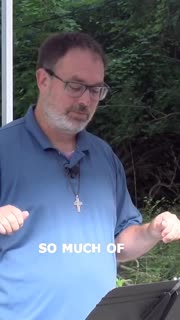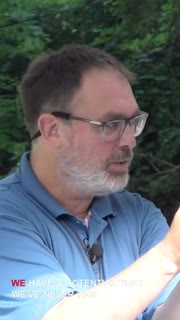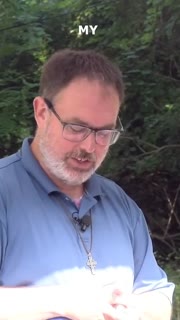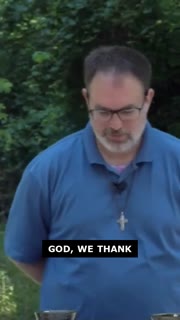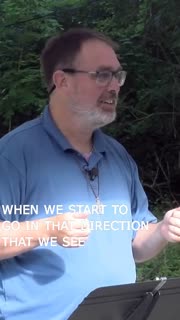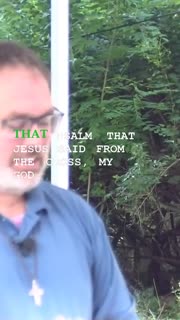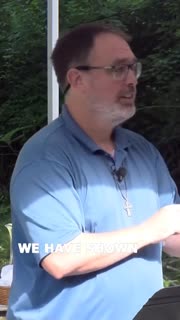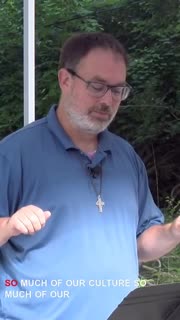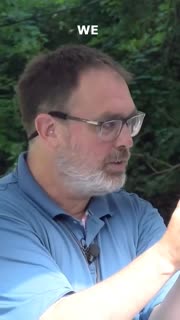Embracing God's Majesty: Stewardship, Praise, and Lament
Devotional
Sermon Summary
Bible Study Guide
Sermon Clips
### Quotes for Outreach
1. "So much of our culture so much of our own personal energy I hate to say it but we're going to be honest about the mirror that we look into tries to put ourselves at the center of the universe it is so hard to not get sucked into that way of living it has been a part of the human condition from the beginning that we want to put ourselves at the center of the universe and the beautiful thing about praise the beautiful thing about these psalms is it reminds us that it puts god at the center god is at the center of the universe and it puts us in our place." [27:28] (39 seconds)
2. "We have a potential that we've never had before to be stewards of God's creation. We spent a lot of time creating, producing things that advanced us and created all kinds of destruction. This is the first time in history we're going, wait a minute, we've got to think through some things. We've got to use these brains God gave us to think through the whole piece organically." [32:19] (29 seconds)
3. "My prayer is that whatever your memory is that brings you back to the majesty of God and helps you remember your place, not a place of servitude, not a place of obscurity, but a place of importance and stewardship in God's creation with God at the center, may we remember the majesty. May we trust God's purpose and power in us, and may we rejoice. Oh Lord, our Lord, how majestic is your name in all the earth." [34:23] (37 seconds)
4. "God, we thank you that somehow in the mystery of this sacrament, the majesty of you comes to us in the broken bread, in the cup poured out. Lord, may we always remember the power of your grace in our lives. And may we in turn go out and be bread for a hungry world. In Jesus' name we pray. Amen." [54:00] (42 seconds)
### Quotes for Members
1. "When we start to go in that direction that we see again and again and again and again and again and again and again and again and again in scripture right when peter says to jesus the first time turn away from me i'm a sinful man i'm not worth being in your holiness and yet the psalm proclaims god has made us a little lower than angels what was god thinking god has made us a little lower than angels crowned with glory and honor we are given dominion we are given authority we are given agency we are given creativity we are given the capacity to impact well beyond our own place in the universe." [29:13] (49 seconds)
2. "That psalm that Jesus said from the cross, my God, my God, why have you forsaken me? One of the most poignant words in scripture, words that if you haven't cried them out in your soul, you will. Trust me. I don't know if you've ever read through the whole psalm. It's really powerful, the movement of that psalm, because it's this honest, heartbreaking lament and yearning for God. And yet, listen to how it wraps up. For dominion belongs to God. God rules the nations and all creation. To God, indeed, all who sleep in the earth bow down before God shall bow all who go down to the dust, and I shall live for him." [33:13] (49 seconds)
3. "We have shown ourselves very capable of letting our creations get well out of our hands right i don't know why this week but i spent so much time talking about ai about artificial intelligence about this amazing technology that as we speak may be running beyond our own intellectual capacity how do we understand it part of god's creation is it separate from God's creation this week at camp we're going to be looking at the theme of time ken our youth director has been spending a lot of time thinking about the different eras of human history and about how in each phase God's presence is more and more revealed God's purpose is more and more revealed even as we seem like we're kind of on the edge." [31:12] (63 seconds)
4. "So much of our culture so much of our own personal energy I hate to say it but we're going to be honest about the mirror that we look into tries to put ourselves at the center of the universe it is so hard to not get sucked into that way of living it has been a part of the human condition from the beginning that we want to put ourselves at the center of the universe and the beautiful thing about praise the beautiful thing about these psalms is it reminds us that it puts god at the center god is at the center of the universe and it puts us in our place." [27:28] (39 seconds)
5. "We have a potential that we've never had before to be stewards of God's creation. We spent a lot of time creating, producing things that advanced us and created all kinds of destruction. This is the first time in history we're going, wait a minute, we've got to think through some things. We've got to use these brains God gave us to think through the whole piece organically." [32:19] (29 seconds)
Ask a question about this sermon
1. "So much of our culture so much of our own personal energy I hate to say it but we're going to be honest about the mirror that we look into tries to put ourselves at the center of the universe it is so hard to not get sucked into that way of living it has been a part of the human condition from the beginning that we want to put ourselves at the center of the universe and the beautiful thing about praise the beautiful thing about these psalms is it reminds us that it puts god at the center god is at the center of the universe and it puts us in our place." [27:28] (39 seconds)
2. "We have a potential that we've never had before to be stewards of God's creation. We spent a lot of time creating, producing things that advanced us and created all kinds of destruction. This is the first time in history we're going, wait a minute, we've got to think through some things. We've got to use these brains God gave us to think through the whole piece organically." [32:19] (29 seconds)
3. "My prayer is that whatever your memory is that brings you back to the majesty of God and helps you remember your place, not a place of servitude, not a place of obscurity, but a place of importance and stewardship in God's creation with God at the center, may we remember the majesty. May we trust God's purpose and power in us, and may we rejoice. Oh Lord, our Lord, how majestic is your name in all the earth." [34:23] (37 seconds)
4. "God, we thank you that somehow in the mystery of this sacrament, the majesty of you comes to us in the broken bread, in the cup poured out. Lord, may we always remember the power of your grace in our lives. And may we in turn go out and be bread for a hungry world. In Jesus' name we pray. Amen." [54:00] (42 seconds)
### Quotes for Members
1. "When we start to go in that direction that we see again and again and again and again and again and again and again and again and again in scripture right when peter says to jesus the first time turn away from me i'm a sinful man i'm not worth being in your holiness and yet the psalm proclaims god has made us a little lower than angels what was god thinking god has made us a little lower than angels crowned with glory and honor we are given dominion we are given authority we are given agency we are given creativity we are given the capacity to impact well beyond our own place in the universe." [29:13] (49 seconds)
2. "That psalm that Jesus said from the cross, my God, my God, why have you forsaken me? One of the most poignant words in scripture, words that if you haven't cried them out in your soul, you will. Trust me. I don't know if you've ever read through the whole psalm. It's really powerful, the movement of that psalm, because it's this honest, heartbreaking lament and yearning for God. And yet, listen to how it wraps up. For dominion belongs to God. God rules the nations and all creation. To God, indeed, all who sleep in the earth bow down before God shall bow all who go down to the dust, and I shall live for him." [33:13] (49 seconds)
3. "We have shown ourselves very capable of letting our creations get well out of our hands right i don't know why this week but i spent so much time talking about ai about artificial intelligence about this amazing technology that as we speak may be running beyond our own intellectual capacity how do we understand it part of god's creation is it separate from God's creation this week at camp we're going to be looking at the theme of time ken our youth director has been spending a lot of time thinking about the different eras of human history and about how in each phase God's presence is more and more revealed God's purpose is more and more revealed even as we seem like we're kind of on the edge." [31:12] (63 seconds)
4. "So much of our culture so much of our own personal energy I hate to say it but we're going to be honest about the mirror that we look into tries to put ourselves at the center of the universe it is so hard to not get sucked into that way of living it has been a part of the human condition from the beginning that we want to put ourselves at the center of the universe and the beautiful thing about praise the beautiful thing about these psalms is it reminds us that it puts god at the center god is at the center of the universe and it puts us in our place." [27:28] (39 seconds)
5. "We have a potential that we've never had before to be stewards of God's creation. We spent a lot of time creating, producing things that advanced us and created all kinds of destruction. This is the first time in history we're going, wait a minute, we've got to think through some things. We've got to use these brains God gave us to think through the whole piece organically." [32:19] (29 seconds)
